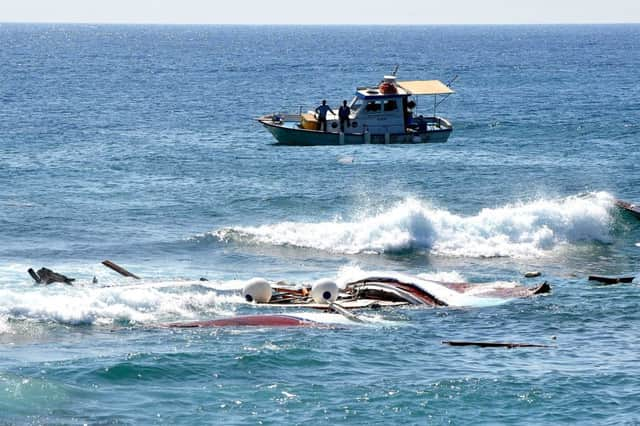Martyn McLaughlin: Humanity’s failure over migrants


Given a fortnight of the general election campaign remains, it would be premature to suggest that the toxic narrative on immigration has reached a nadir. Still, it is difficult to conceive of a policy more heinous than the British government’s stance on the escalating humanitarian crisis in the Mediterranean.
The harrowing accounts emerging from the waters north of Libya are flecked with uniquely macabre detail. Children’s shoes were found floating by wreckage; one body recovered was that of an African boy thought to be as young as ten; one Bangladeshi survivor said hundreds of those who perished after their fishing boat capsized at nightfall were locked in the holds below. “They died like rats in a cage,” he told prosecutors.
Advertisement
Hide AdAdvertisement
Hide AdWhat is most disquieting is the haunting routine of it all. Once again, corpses of the desperate and dispossessed wash up on Europe’s doorstep. Ignominious records are rewritten almost daily while the subterranean graveyard of the Ionian basin grows ever more crowded.


This is the shameful legacy of a concerted international strategy of neglect in which Britain, wielding death as a deterrent, plays an inglorious role.
In a written answer to the House of Lords last October, foreign office minister Baroness Anelay said the UK would not support search and rescue operations in the Mediterranean.
“We believe that they create an unintended ‘pull factor’, encouraging more migrants to attempt the dangerous sea crossing and thereby leading to more tragic and unnecessary deaths,” she reasoned.
With the might of Britain’s Navy playing war games on the Clyde in Operation Joint Warrior while children drown, the moral repugnance of pulling up the drawbridge to Fortress Europe is not in doubt, but recent events also demonstrate the folly in this logic.
Since last autumn, search and rescue resources in the region have been greatly diminished after Italy brought to an end Operation Mare Nostrum, a compassionate initiative which, over the space of a year, cost Rome around £84 million, but saved the lives of more than 140,000 migrants from floundering vessels and flimsy rubber dinghies.
The substitute scheme, Operation Triton, has an annual cost of just £28m despite being a Europe-wide undertaking managed by Frontrex, the EU’s border agency. Its primary remit is not humanitarian, but border management. The operation has just six boats, two aeroplanes and one helicopter at its disposal, and patrols only as far as 30 nautical miles south of the Italian coast.
Yet at least 1,500 migrants have died trying to reach Europe this year, at least 30 times the death toll at the same period in 2014. The latest tragedy took place 120 miles off Lampedusa, one of the Pelagie Islands to the south of Italy. The first vessels to respond were a Portuguese container ship and Italian prawn boats.
Advertisement
Hide AdAdvertisement
Hide AdFaced with the gravest refugee crisis since the Second World War, we are in the absurd situation where commercial ship operators, bound by international maritime conventions, play a fuller role than countries.
With the “pull factors” cited by Baroness Anelay disproved, what is of consequence is the “push” factors: people fleeing a succession of collapsed states in Africa and the Middle East; poverty; human rights abuses; disease; the rising threat posed by Islamic militants.
Many of those who take to the cold, dark waters of the Mediterranean do so out of despair and fear. The most recent statistical analysis by Frontex shows that of the 220,194 migrants who made sea crossings last year, the vast majority hailed from Syria (66,698), where a bloody civil war has created 3,977,538 refugees, according to the latest figures from the UN High Commissioner for Refugees.
If the nation which sanctioned the Kindertransport mission has a shared responsibility in this, it is doing its damnedest to shirk it. A government that has taken in just 142 Syrian refugees under its flagship Vulnerable Persons Relocation Scheme – compared to 38,000 across Europe – has an equally threadbare commitment to Operation Triton, with just one immigration officer seconded to help.
In an uncharacteristic show of British regard for other sovereign territories, James Brokenshire, the Tory immigration minister, recently told the Commons that “matters of search and rescue remain with Italy and other member states in respect of their territorial waters”. The government, he stressed, was not turning a blind eye, but said the emphasis should to be on rooting out organised trafficking gangs.
This is a crucial area of concern that must be tackled, but it is not the only one vexing the government, according to a paper from a meeting last year of the Commons European scrutiny select committee.
In it, the committee notes the government’s “reservations” over the European Commission’s Mediterranean task force, namely “legal migration, the relocation and resettlement of refugees, and the possibility of developing new forms of ‘protected entry’ to the EU”.
In short, the desire to pander to anti-immigration sentiment at home is paramount. Self interest and political expediency reigns, trumping any effort to assist those who drown while dreaming of Europe.
Advertisement
Hide AdAdvertisement
Hide AdThe hand-wringing over border control and migration management that has come to define the politics of migration policy is not working. A continent-wide strategy should explore the viability of legal entry routes and better manage land borders, such as those between Bulgaria and Syria, so that migrants are not diverted to treacherous sea passings. Above all, Britain must step up and initiate a united humanitarian effort, one properly resourced and stretching beyond the Pelagie Islands. To do otherwise is to submit to the fear and loathing of the anti-immigration lobby and make a stranger of common human decency.